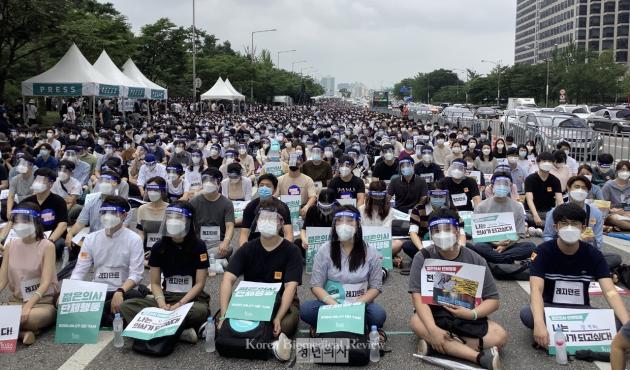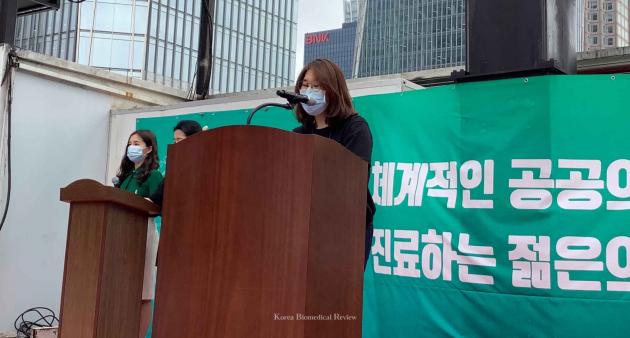More than 6,000 medical residents and interns staged a rally to protest against a plan of the government and the ruling party to increase medical school admission quotas in Yeoeuido, Seoul, on Friday.

As part of the country's medical workforce reform plan, the government plans to expand admission quotas at medical schools by 4,000 over the next 10 years by turning out 400 more physicians annually from 2022. The government also aims to open a new public medical school to broaden the reach of health care services.
The Korea Intern Resident Association (KIRA) thought the number of participants would be small because of the Covid-19 pandemic. However, more than 13,000 young trainees joined the strike at more than eight sites in the country, according to the association.
The participants urged the government to revise its plan and not ignore the poor quality of medical teaching and training in Korea, saying that doctors' increase will not solve these problems.
They wore masks to prevent viral infections, filled out the health status questionnaires, and measured their body temperatures. The trainee doctors also tried to keep a distance of one meter or more from one another.

"Young doctors’ collective actions will not stop until our request is accepted," KIRA President Park Ji-hyun said. "Just a week ago, we never thought we would be here, not at our hospitals caring for patients."
Trainee doctors who have worked silently at the forefront of the Covid-19 pandemic are shocked by the government's flawed policy that plans to ruin the nation's medical care system, Park added.
"The government has praised us as warriors at the forefront of the Covid-19 containment efforts. Now they are describing us as troublemakers for not agreeing with its policy."
Park stressed that the government's plan is not the solution to the current problem.
"Korea's birthrate is decreasing every year, but the increase rate of doctors was 2.4 percent, which ranks first among OECD countries," Park said. "The public may feel more doctors are needed, but that is because medical institutions are concentrated in large cities, including the Seoul metro region. Most people prefer large private hospitals in metropolises to public medical centers in rural areas."
That explains why the government’s plan to set up public medical schools in provinces will go up in smoke.
The protesters expressed support for KIRA head’s remarks.
"I decided to take part in the protest as the government is not listening to the medical workers’ voices. I could no longer ignore the collapse of the medical field," a Seoul National University Hospital resident said. "I call for the government to hear the voices of young doctors."
An intern working at a hospital outside of Seoul said, "To increase the number of medical school students, the government should have consulted with doctor groups in advance and collected opinions on what needs to be done beforehand."
It would have been better if the government and the medical community had discussions first. Unfortunately, the government announced its plans without any prior consultation, she added.
KIRA announced trainee doctors' demands, including the formal discussion of the government policies, which the medical community describes as “four evils” – an increase of medical school admission quotas, establishment of a public medical school, introduction of telemedicine and giving insurance benefits to some herbal medicines.
The Ministry of Health and Welfare expressed regrets on trainee doctors’ collective action defying its calls for talks to resolve the issue.
"It’s a regret that trainee doctors stopped essential treatment linked to people's lives and safety," Vice Health Minister Kim Gang-lip said.

